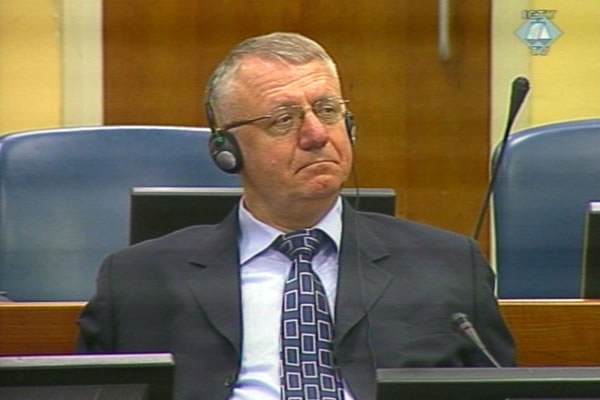Home
PROSECUTION OPPOSES SESELJ'S MOTION TO STAY PROCEEDINGS
The prosecution has dismissed the claims of the Serbian Radical Party leader about his unreasonably long detention and ‘unnecessary delays’ in his trial listing in detail Seselj’s own responsibility for the ‘slow pace’ of the trial. Also, the prosecution has recalled that Seselj needed only to ask for provisional release and he would not have spent a good part of the previous 11 years in detention
 Vojislav Seselj in the courtroom
Vojislav Seselj in the courtroom During the Tribunal’s winter recess, Vojislav Seselj filed an appeal against the decision of the Trial Chamber to continue his trial at the point where it stopped: the parties’ closing arguments after new judge Niang from Senegal has acquainted himself with the case. In its response to the appeal, the prosecution noted that the Trial Chamber assessed the situation properly and decided to proceed in ‘the most expeditious way’ to respect the rights of the accused. The Appeals Chamber is therefore urged to deny the Serbian Radical Party leader’s appeal and to order the proceedings to continue so that a judgment can be rendered as soon as all the requirements have been met.
The prosecution paid particular attention in the motion to the accused’s allegation that he has been detained for too long and that in the past 11 years the trial has often been ‘unnecessarily delayed’.
First, the prosecution explained, a trial before an international tribunal that lasts several years shouldn’t in itself be unreasonable. Four cases before the Tribunal for Rwanda lasted between 10 and 15 years, the prosecution recalled. Seselj himself was largely to blame for the fact that he spent all this time in detention, instead of being at home for the good part of it. Seselj has never asked for provisional release. The accused has refused to seek guarantees from ‘pro-Western, mob-style, treacherous’ Serbian authorities. Provision of state guarantees is one of requirements for an accused held in detention in The Hague to be granted provisional release. Also, the prosecution noted that concurrent to his detention, Seselj served three contempt of court sentences amounting to a total of four years and nine months in prison.
As for the purported ‘unnecessary delays’ of the trial, the prosecution recalled that Seselj arrived in The Hague in February 2003 and that the trial was slated to begin in November 2006. Seselj, however, went on hunger strike when the Tribunal decided to appoint defense counsel to him. The trial was re-started exactly a year later. The one-year delay caused by the ‘out of court activities’ of the accused couldn’t be called ‘unnecessary’, the prosecution concluded. The trial continued unobstructed until January 2009 when it was suspended again because of ‘the risk to the integrity of the trial’ and threats to prosecution witnesses. In 2010, the trial was interrupted again when the witnesses called to give evidence by the Trial Chamber weren’t able to come to The Hague. The accused didn’t object to that. This cannot be termed ‘unnecessary delays’, the prosecution noted.
Also, Seselj’s inability to work in the official languages of the Tribunal has also influenced the ‘pace of the trial’. Seselj asked for the materials to be delivered to him ‘on paper, in the Cyrillic alphabet’. In some situations, this has led to months of delay. Some delay has been caused by Seselj’s behavior. At one point, for instance, he demanded that the court investigate his claims about the alleged pressure of the OTP on the witnesses. The complexity of the case that spans three entities (Croatia, Vojvodina and BH) should also be borne in mind, the prosecution noted, as does the involvement of the accused in a large-scale joint criminal enterprise.Linked Reports
- Case : Seselj
- 2013-12-16 SESELJ JUDGMENT WILL NOT BE DELIVERED BEFORE SECOND HALF OF 2014
- 2013-12-02 PROSECUTION CALLS FOR SESELJ JUDGMENT IN ‘REASONABLE TIME’
- 2013-11-28 SESELJ MAY REAP REWARDS OF PERSISTENCE AGAIN
- 2014-02-14 APPEALS CHAMBER TO RULE ON SESELJ’S MOTION TO TERMINATE PROCEEDINGS
- 2014-06-06 JUDGES DENY SESELJ'S DEMAND FOR HIS TRIAL TO END
- 2014-06-16 WILL SESELJ BE GRANTED PROVISIONAL RELEASE PENDING JUDGMENT?
